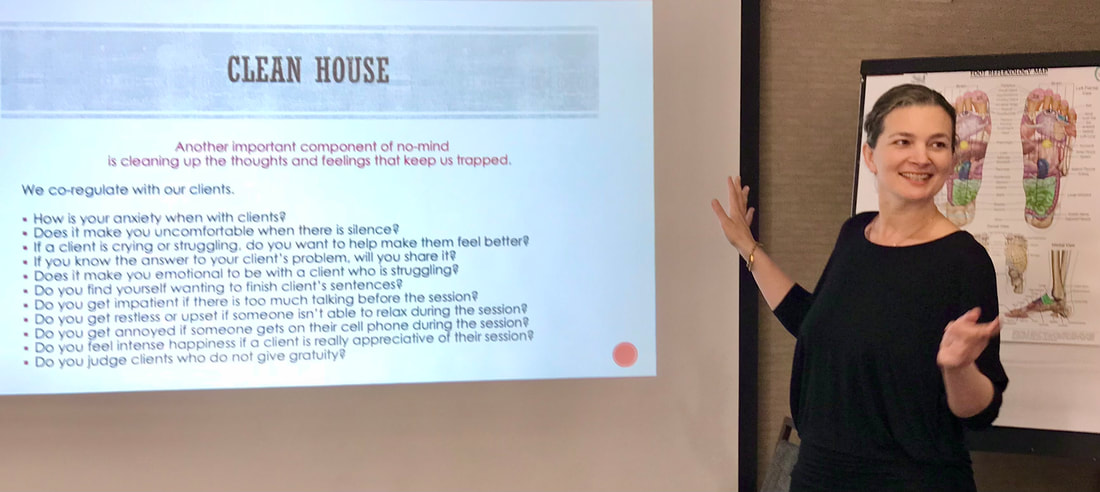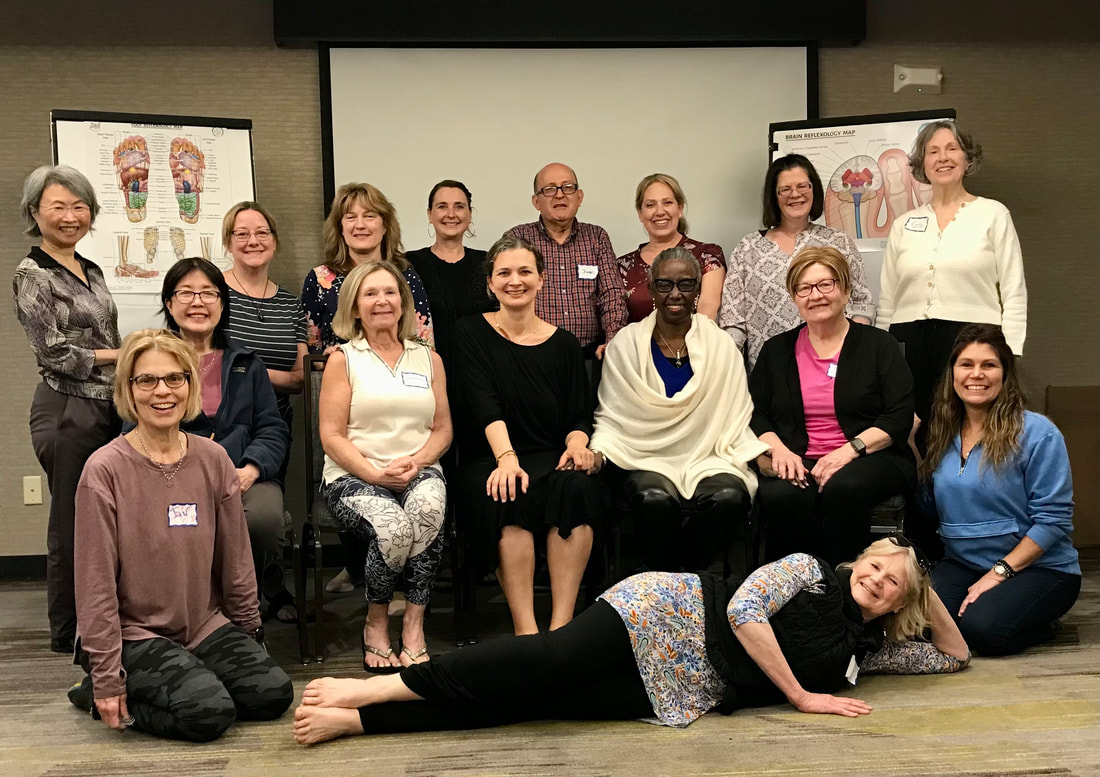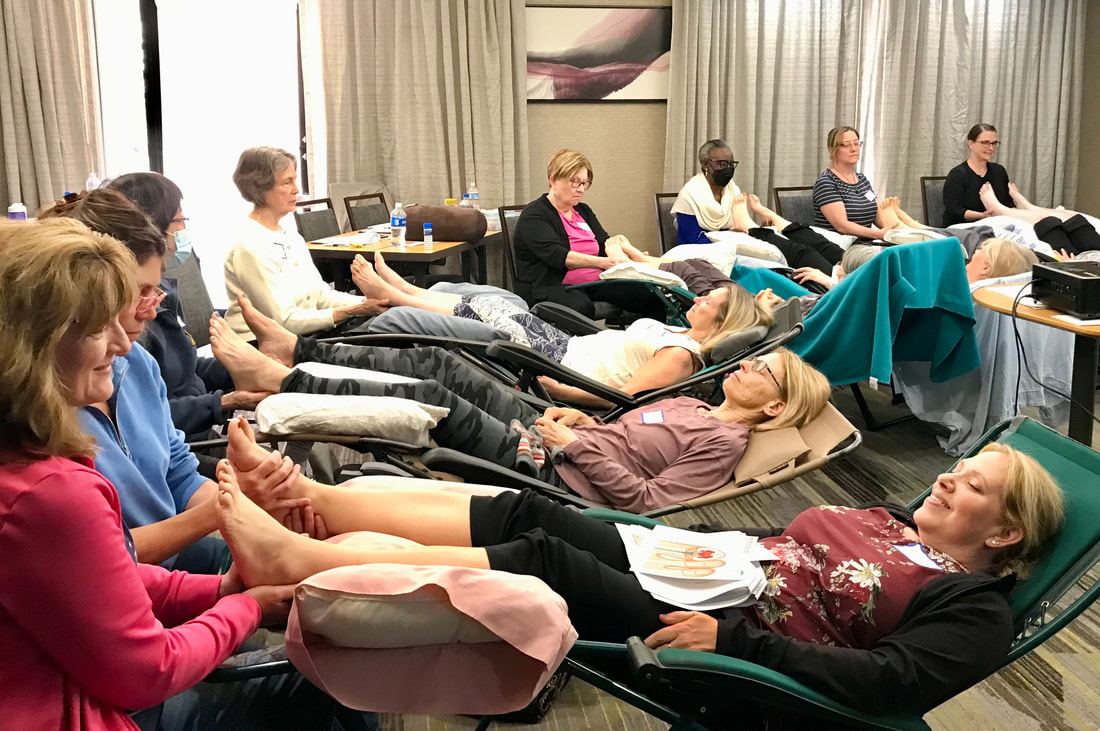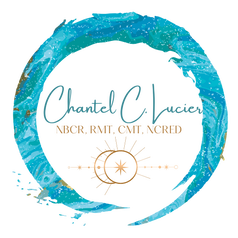Reflexology for Trauma & Addiction
with Chantel C. Lucier
September 23-24, 2023
In Person LIVE in Columbus, Ohio!
COURSE DESCRIPTION:
Chantel’s 2-day reflexology workshop is comprised of three segments that utilize lecture, demonstration, and hands-on practice. The three segments that make up the workshop are:
Adopting what Chantel calls “The No-Mind Approach to Wellness” during a session helps the practitioner to release judgment and any need to control or fix the client. It also creates an opportunity for the client to release what they too may be holding onto since their diagnosis. This, in turn, creates a more conducive environment for the client’s healing process. For the session duration the client is held as if in perfect health. In addition, students will learn to cultivate a thorough and compassionate intake process. Because injury, illness, discomfort, and disease are not always what they seem, students will learn tools to assess and address not only the symptoms but also what may lie beneath the surface. The root cause—or what Chantel refers to as the emotional underbelly of the injury, illness, or disease—will be explored.
This combination of releasing the dis-ease (or diagnosis), and using the No-Mind Approach, coupled with addressing the origin of the dis-ease, provides a solid routine for the practitioner to follow.
In the third segment, students will learn:
These three segments aim to bring unity to the reflexology session by:
In all segments, students will cultivate their heart space and enter what Chantel refers to as the “back body” to nurture good listening skills, heart-centered responses, and effective session.
STUDENTS WILL LEARN:
SCHEDULE AND HOURS DEFINED: This 16-hour, 2-day weekend workshop will have 14 educational hours. Lunch breaks and out of classroom assignments are not included.
REGISTRATION: This workshop is open to all levels. While some techniques are advanced, Chantel’s approach makes the content, methods, and techniques easily accessible to all. To register visit the Massachusetts Association of Reflexology HERE.
PAYMENT: If you are a current member of ANY state reflexology association you are eligible for the "Member" rate. To qualify for this discount, choose the member button for payment and send a copy of your current association membership to [email protected].
EARLY BIRD SPECIAL IS NOW THROUGH AUGUST 13, 2023
Members $325 / Non-Members $375
After August 13, 2023:
Members: $375 / Non-Members $425
Chantel’s 2-day reflexology workshop is comprised of three segments that utilize lecture, demonstration, and hands-on practice. The three segments that make up the workshop are:
- The No-Mind Approach to Wellness (a Guide for Releasing the Diagnosis in Sessions)
- A Compassionate Intake Process to Assess and Address the Emotional Underbelly of the Client’s Discomfort &/or Dis-ease
- Reflexology Protocols (hereafter referred to as "Guides") for Trauma and Addiction
Adopting what Chantel calls “The No-Mind Approach to Wellness” during a session helps the practitioner to release judgment and any need to control or fix the client. It also creates an opportunity for the client to release what they too may be holding onto since their diagnosis. This, in turn, creates a more conducive environment for the client’s healing process. For the session duration the client is held as if in perfect health. In addition, students will learn to cultivate a thorough and compassionate intake process. Because injury, illness, discomfort, and disease are not always what they seem, students will learn tools to assess and address not only the symptoms but also what may lie beneath the surface. The root cause—or what Chantel refers to as the emotional underbelly of the injury, illness, or disease—will be explored.
This combination of releasing the dis-ease (or diagnosis), and using the No-Mind Approach, coupled with addressing the origin of the dis-ease, provides a solid routine for the practitioner to follow.
In the third segment, students will learn:
- Anatomy and physiology of the brain and the areas, structures, and glands that play a role in thought processes, habitual negative thought patterns, and dissociative and detachment disorders and tendencies.
- Specific attention will be paid to the amygdala, hippocampus, hypothalamus, thalamus, basal ganglia, and pituitary gland. Also, an understanding of the role of the limbic system versus the prefrontal cortex and how to address these areas via the mini map in our hands and feet.
- Areas of the body that may show symptoms, pain, or imbalances in those who have experienced trauma and for those with active or past alcoholic or addictive behaviors.
- Which structures, glands, and areas of the brain require detailed work for trauma and addiction.
- The HPA axis and the target organs, glands, or systems affected by the trauma &/or addiction from a reflexology perspective.
- The neurological system and how reflexology works via this system, directly related to how we receive internal and external stimuli.
- Reflexology protocols to address trauma and addiction and how they may vary depending on the type of trauma or addition (e.g., opioid, alcohol, nicotine, marijuana, or stimulants).
- Self-care tools to use and impart to clients for maintenance and recovery.
These three segments aim to bring unity to the reflexology session by:
- Releasing our ideas of what the client needs.
- Suspending our judgment of the client or diagnosis.
- Learning how to retrieve information using a compassionate intake process.
- Understanding trauma, subtle energy, and how to create safe spaces for the client.
- Asking the right questions to target the underbelly of the dis-ease and empowering the client to discover the answers on their own.
- Aligning our energetic body to best serve our client.
- Having a rich understanding of the nervous system and the Bodymind in order to best address a client’s concerns.
In all segments, students will cultivate their heart space and enter what Chantel refers to as the “back body” to nurture good listening skills, heart-centered responses, and effective session.
STUDENTS WILL LEARN:
- Reflexology techniques and methods.
- Anatomy and physiology of the brain.
- The parts of the brain (specifically the cortices, lobes, and glands) responsible for mood, addictive behavior, and emotional processing.
- Reflexology protocols for trauma, addiction, and recovery.
- Specific reflexology methods and techniques for a detailed and integrative session.
- How to evaluate and assess the client using a compassionate intake process to best address the emotional underbelly of what is underneath the symptom &/or diagnosis.
SCHEDULE AND HOURS DEFINED: This 16-hour, 2-day weekend workshop will have 14 educational hours. Lunch breaks and out of classroom assignments are not included.
REGISTRATION: This workshop is open to all levels. While some techniques are advanced, Chantel’s approach makes the content, methods, and techniques easily accessible to all. To register visit the Massachusetts Association of Reflexology HERE.
PAYMENT: If you are a current member of ANY state reflexology association you are eligible for the "Member" rate. To qualify for this discount, choose the member button for payment and send a copy of your current association membership to [email protected].
EARLY BIRD SPECIAL IS NOW THROUGH AUGUST 13, 2023
Members $325 / Non-Members $375
After August 13, 2023:
Members: $375 / Non-Members $425



